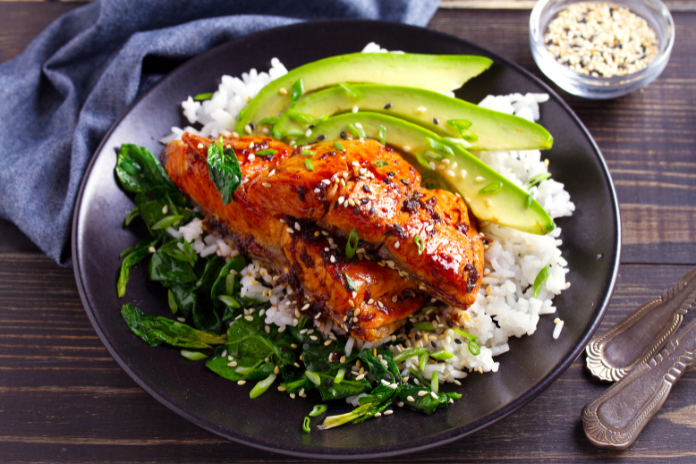Gaining weight is challenging for many people. If you’ve been on the journey, you understand the emotions that come with it. In brief, learning how to gain weight with a fast metabolism is no easy feat.
There will be many attempts while you find a method that works for you. Generally, healthy methods are the way to go if you want to gain and sustain weight.
Besides healthy choices, you need to be in the right mindset. Although you expect physical results, you should not intertwine your expectations with your happiness. For instance, you shouldn’t tell yourself, “I’ll be happier once I reach this weight goal.” You start attributing your self-worth to a particular body image, at which point you lose yourself.
Learn to be present, consistent, enjoy the process, and embrace your body during each step. With that in mind, let’s further discuss how to gain weight with a fast metabolism successfully.
What Does High Metabolism Mean?
First, you need to understand metabolism and why it is so important. Metabolism is the body’s energy expenditure system. The energy fuel source is the calories you consume, whether from foods or drinks.
Metabolism is a chemical process and is essential for bodily functions, such as maintaining body temperature and brain function, for instance.
Metabolic rate, the total amount of energy burned, is the rate at which metabolism occurs. A common element of metabolic rate is basal metabolic rate (BMR).
BMR describes the energy the body uses while at rest. A few factors can affect BMR, such as age, sex, and body composition. However, body size and composition are not good determinants of whether someone has a fast or slow metabolism. This is because genes are mostly what contribute to the speed of metabolism.
A high metabolism burns more calories while active but also at rest. Ultimately, you’ll need to consume more calories to sustain weight and even more to gain additionally.
How to Gain Healthy Weight with a Fast Metabolism
Metabolism is essential, but it is only a tiny piece of the puzzle regarding weight gain. Healthier lifestyle choices like a good diet and exercise can get you to your desired weight. Read on for some quick tips.
Get into weight training.
This is great if you want to learn how to gain muscle weight with a fast metabolism. Basal metabolic rate, a component of your metabolism, is connected to lean body mass (bones, body fluids, muscle mass). Weight training helps increase muscle mass.
Many are aware of the muscle-building benefits of exercise, but if that is not your goal, you should still stay physically active. Exercise stimulates appetite, and you can store the extra calories you consume as muscle rather than fat.

Regulate your sleep schedule.
Following a healthy diet without proper sleep will still make weight gain difficult. Sleep deprivation causes unhealthy weight gain. This is due to the release of the hormone ghrelin, which activates the brain’s hunger center. Since the goal is healthy weight gain, adequate sleep is necessary.
Add weight gain foods into your diet.
There are essential nutrients that your body needs to sustain function.
– Macronutrients:
These are nutrients required in large amounts by the body to function correctly. The list of foods under each macronutrient is vast and not only limited to the foods given below as examples. These nutrients include:
- Carbohydrates (Carbs) – 4 calories per gram
- Carbs are broken down as sugars and used as the body’s primary energy source during movement. Complex carbohydrates digest more slowly than simple carbohydrates. The faster the breakdown, the higher the amount of weight gain. Although complex carbohydrates are generally healthier, while simple carbohydrates are mainly found in processed foods, there are exceptions. Bananas, raisins, and honey are some examples of simple carbohydrates. Some examples of complex carbs include quinoa, barley, and whole-wheat bread. A balance between the carbs will make for a significant weight gain diet.
- High-calorie carb examples: Pasta, Oats, Potatoes, and Brown rice.
- Proteins – 4 calories per gram
- Proteins help with the function and regulation of many systems in the body.
- Protein from plant sources includes vegetables, such as broccoli and asparagus; Whole grains, such as oats and wheat; nuts, such as almonds and pecans; seeds, such as flax seeds and chia seeds; legumes, such as peas and beans.
- Protein from animal sources includes unprocessed red meat, such as lamb and goat. Processed choices include sausage and ham.
- High-calorie protein examples: Eggs, Cheese, Nuts, Red meat, and Beans.
- Fats – 9 calories per gram
- Dietary fats are essential for the body’s function. It also helps in the absorption of minerals and nutrients. Healthier fat choices include monosaturated and polyunsaturated fats, liquid at room temperature. They are known to be better choices to decrease the levels of LDL.
- Canola and fish oil are some examples of polyunsaturated fats.
- Avocado oil and olive oil are considered monosaturated fats.
- High-calorie fat examples: Avocadoes, Fish oil, and Olive oil.

– Micronutrients:
These are vitamins and minerals essential for daily function. Deficiency could play a role in malnutrition; hence, it can contribute to weight gain challenges. Diet is the primary source of micronutrients. Here are some examples of micronutrients that should be incorporated into your diet:
- Vitamin A
- Kale
- Broccoli
- Carrots
- Milk
- Vitamin B6
- Bananas
- Poultry
- Salmon
- Beef liver
- Vitamin C
- Strawberries
- Citrus fruits
- Tomatoes
- Green pepper
- Zinc
- Seafood: Oysters, lobsters, Crabs
- Low-fat yogurt
- Chickpeas
- Chicken thighs

– Snacks
Healthy snacks in-between meals are a great way to add some calories. Below are a few examples:
- Whole wheat toast with nut butter. This could be peanut butter or almond butter, for example.
- Whole wheat toast with some avocado spread.
- Sliced apples with nut butter.
- Dried fruits sprinkled in 2% Greek yogurt, or eat them separately.
- Boiled eggs.
- Snack/nutrition bars. Choose bars with at least 8g of proteins and 5g of fats.
Give it time.
You probably don’t want to hear this, but you might need to give your body some time. Age has a significant influence on BMR. As you get older, muscle mass decreases. This is replaced by body fat, which slows your metabolism causing weight gain. This is why it is important to maintain a workout regimen.
Disclaimer:
These tips are not a substitution for professional advice. You are encouraged to visit your physician, dietician, or other health professionals. They can help you rule out factors affecting weight, such as hormonal imbalances. Additionally, they can provide a personalized meal plan.





Leave a Reply